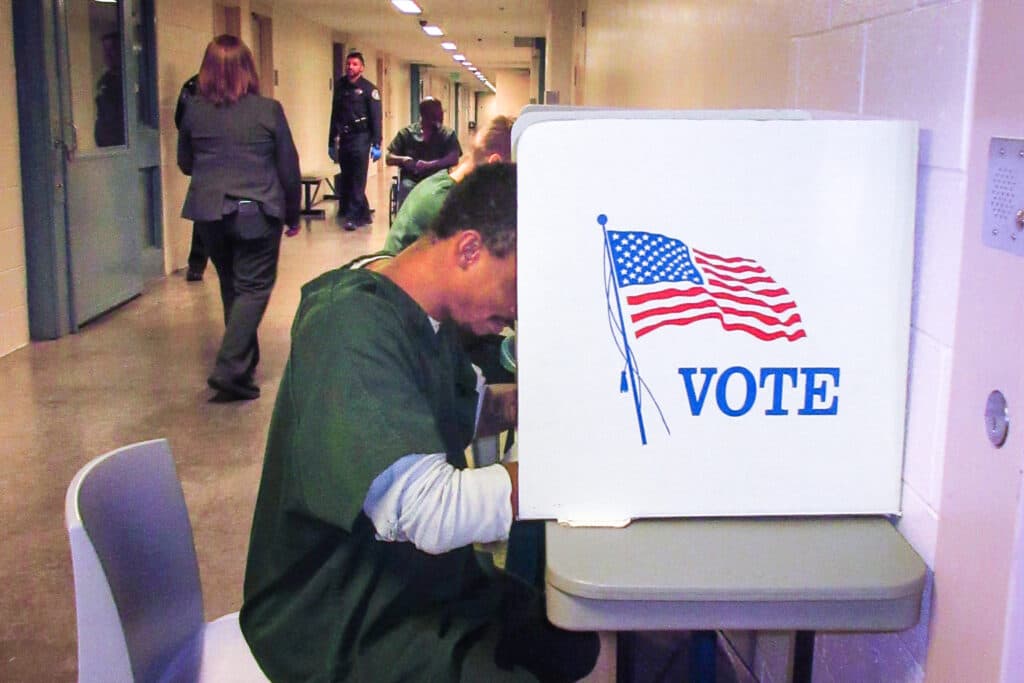Jerome Whitfield didn’t know he could vote.
“I thought my background may prevent me from that, but by the grace of God and everything else, I'm able to,” he said this week.
Whitfield registered to vote, filled out his ballot and dropped it off all within the same hallway — not too far from his pod at the Denver County Detention Center, where he’s awaiting his sentencing.
“I've been here for a couple months now,” Whitfield said. “[Voting] makes me feel like I'm still involved in the community out there.”

Many people, both those inside the system and out, don’t know who exactly is eligible to vote.
But people in custody who aren’t serving felony sentences, people in pre-trial detention and people deemed eligible by the clerk and recorder’s office can all vote.
Denver’s Clerk and County Recorder Paul López said he often hears that people with felonies don’t vote because they believe they can’t.
“That's false. We want to make sure that folks can confidently be able to say, ‘Yes, I'm registering to vote, even as somebody who has been convicted of a felony in the past,’” López said.
The Denver County Detention Center is the leading force behind making in-person voting more accessible in jails throughout the state.
López and Elias Diggins, the Denver sheriff, worked together with the Colorado Criminal Justice Reform Coalition and the League of Women Voters during the previous presidential election to ensure that incarcerated people who were eligible to vote could do so.
Expanding voter access statewide
Their efforts in 2020 caught the attention of the rest of the state, and SB24-072 was passed this legislative session.
The bill requires clerks to make their best efforts to work with their county’s sheriff to facilitate voting for eligible incarcerated people.
“We had no idea that what started in Denver would now be something that's done in jails across Colorado,” Sheriff Diggins said. “So today, we're happy to continue to be a leader in this field.”
Since Denver is a pioneer in jail voting, CCJRC, the sheriff’s office and election officials have been training other counties leading up to election day.
“We're all working together to make sure this goes smoothly and well. So we've paired together to do trainings for other clerk's offices who have never done this before,” Giddings said. “(We) would just run mock in-person voting events for their jails and kind of run 'em through all the different scenarios that could happen.”

What voting in a jail looks like, and means to those there.
The Colorado Criminal Justice Reform Coalition (CCJRC) was inside the Denver County Detention Center on Wednesday helping people register to receive their ballots.
The group set up two stations across the hallway from each other, both with people completing the registration process, and one with the ballot drop box.
At 36 years old, Raul Vidaurri voted for the first time, something he feels is pushing him in the right direction.
“It's enlightening. Very enlightening,” Vidaurri said. “I got into a bit of a situation, but I’m glad to be in here, get my head right. [This is] like a new start, a new beginning.”
CCJRC has been working with the Denver Clerk's office and the detention center to not only streamline the in-prison voting process, but also to make sure the people participating are properly informed.
“This year's ballot has multiple criminal justice reform issues on it,” said Kyle Giddings with CCJRC. “And so the people who will be directly impacted by that should be able to have their voices heard and their ballots cast.”
During previous elections, the first day CCJRC set up the voting stations in jails and detention centers was always the busiest. And this year is no different.
“It’s been crazy busy- the turnout. Every pod has a large group of people that want to make sure their voices are heard in their communities and heard in the presidential race. So we're having huge turnout rates here in Denver so far,” Giddings said.
The detention center averages about 1,200 inmates at a time. While not all of them are eligible to vote, most of the ones who are, do.
“These are folks who want to have a voice in the election. And as long as that's the case, we are going to make sure that they receive a ballot,” López said.
The people voting from inside the Denver detention center aren’t always voting for races in Denver County. Like everyone else, they are voting to their registered address. For example, Whitfield is voting in El Paso County.
He said he’s planning to keep voting for the future.
“Not even for just my future, for my kids's future and my family's future,” Whitfield said. “If you can vote, vote. It may not be making much change, but go ahead and do it.”











